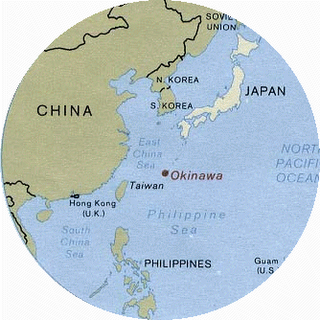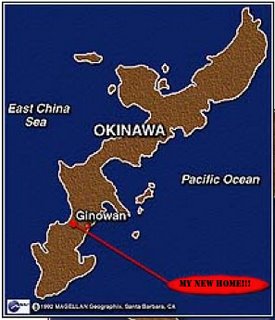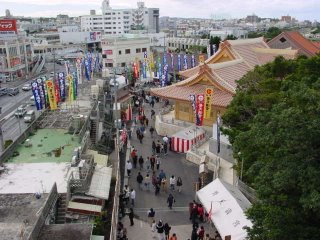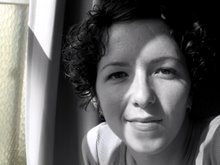When people ask me how I like living in
Japan, I am always surprised. I
don't really consider myself to be living in Japan because, well, I'm not. Okinawa is distinct culturally, historically, and distant geographically from mainland Japan. When I was practicing nationalities in class last week, I asked this one kid who hadn't been paying any attention,
"are you Japanese?" He stared at me for a second and shook his head. I thought he hadn't understood the question.
"JAPANESE?" I repeat. A head shake, and one word mumbled:
"uchina." I'm Okinawan. Answered not in English, not in Japanese, but in Okinawan language. These kids are smarter than you think.
Okinawa was its own nation (the Ryukyu kingdom) until it was annexed forcibly by Japan due to its convenient geographical location and the fact that Japan was threatened by an
independent, prosperous little nation that could be used as a stepping stone to their own islands by their
Enemies. Ha! Sounds like someone you know? If you talk to Japanese people, they know ZIP about Okinawa. Well, I take that back. They know that it is a tropical island convenient for Japanese vacationers to reach without a passport. Hawaii.
Japan announced in 1872 that it was unilaterally abolishing the Ryukyu kingdom. Okinawan officials were replaced with mainland Japanese (sometimes through imprisonment of former Okinawan officials) and the Okinawan king was forcibly exiled to Tokyo. The Meiji
gov't withheld economic reforms from Okinawa that vastly benefited the rest of Japan. Though taxes were proportionately much higher in Okinawa than in the other Japanese prefectures, Okinawans were not allowed to be represented in the national Diet until 1912. The Japanese undertook assimilation policy in Okinawa: they repressed
Oki religion, spiritual healers, and language (at that point, Okinawans were all spoke Ryukyu languages).

During World War II, Okinawa was caught between the hammer and the anvil, as they say. The largest land battle of the Pacific (the Battle of Okinawa) was fought between Japanese and American troops on Okinawan soil. Did Okinawa have anything to do with the war? No. But they sure paid for it. One third of their civilian population was killed in this battle, and just about everything was razed to the ground. Even the landscape was changed forever. Were American troops responsible for all these deaths? Nope. Japanese soldiers threw civilians out of caves or other hiding places into the middle of battle in order to make room for soldiers. They killed crying babies out of fear that they would give away their hiding spots. They shot people for speaking in Okinawan

languages, on the off-chance they might be American spies. Japanese soldiers set up 100s of brothels on the island, forced 100s of Okinawan women into prostitution.

After the war, Okinawa was occupied by the US for 27 years. For decades, American military committed crime after crime, rape after rape, murder after murder on Okinawa, and remained untouched by the law; safe behind their barbed wire and walls. I won't go into detail about the Battle of Okinawa or the occupation, but if you want to read about some gross stuff, read about what one imperial power or another has done to Okinawa for hundreds of years.
When they came, Americans picked the land they wanted and brought in their bulldozers. Families were driven out, houses were destroyed, ton upon ton of crushed coral was spread across the ground that had been family farms for centuries (and coral ruins arable land). Asphalt was put on top. Military bases were built. The Okinawan land-owners are paid "rent" every year for their land, but they are not given the choice of whether they want to lease it.

When the time came for renewel of the land leases, many families refused to sign. Governor Ota (the best governor Okinawa ever had) refused to sign for them, standing firm for his people's rights. Going against their own constitution, mainland Japan broke the law, and allowed the military to remain on the land. In a famous case, one fellow and his family were allowed to enter a base under guard for 2 hours and eat a picnic lunch on their land. It was the first time most of them had seen it.
Now Okinawa "belongs" to Japan again. But nothing has changed. Time after time, the mainland breaks promises that have been made, sacrifices Okinawa's well-being for its own interests. Before '72, many Okinawans struggled for reversion to Japan, assuming that US

bases and military personnel would be removed. Where they? No. They're all still here, over 30 years later. Okinawa is less than 1% of Japan's landmass, yet hosts most of the US military presence in Japan. Why? It's
ok for them to be down here, in Okinawa. But talk about bringing them into your own backyard, and the Japanese citizens would be up in arms in an instant. Who pays the rent money to Okinawans for US bases? Japan does, not America. What is required by Japan of the Americans when they leave Okinawa? Not much. They don't have to return the land in the same state they found it in. They don't have to remove dangerous chemicals or clean it up at all. What will Okinawans get, if and when they finally win back what is their own? What was once miles of farming land will be more of a wasteland.
We can think of Okinawa as Japan's offering to the United States, post WWII. The sacrificial goat.
Okinawan is currently Japan's poorest prefecture. The unemployment rate here is double that of mainland Japan, and many jobs that do exist are service industry. There are more gambling parlors, tourist shops, and restaurants than anyone could ever know what to do with. It's coming time for graduation at
Ginowan High, so these things are ever-present in my mind. In the last few months, seniors have become more subdued. They don't play as much, they look tired and serious. Seniors at my school know that childhood is about to be over, and next month, they will be forced into the world of adults. What awaits them there? My kids aren't high achievers. 80% of them already have part-time jobs, most are from poor families. A lot have trouble at home and act it out at school. In the main hallway, we've got this display:

It's a list of what the future holds for all graduating seniors. On each ribbon is printed the name of a student who has a plan, post-graduation. One line represents those who have been accepted to technical schools, one line those who have found employment, etc. To the far left, you can see a sign that reads "53.1%: 112/211". This is a rolling count of how many graduating seniors have found jobs or a place in a school. Every week, the teachers receive printouts in our mailboxes with pictures of students who were successful that week in finding a job. Every time a kid passes a test for a technical school, it's announced at morning meeting and we all clap and cheer. Because life isn't easy for these kids on this island.
This week is the seniors last week of classes. We're still at 53.1%. What will the remaining 50% of our seniors do? Probably, they will all continue on in their current jobs. They'll be bumped from part-time to full time at the gas station, the grocery store, the cellphone shop. This island could have a better employment rate, could move away from service-industry based jobs if Japan would agree to funnel more money into development and infrastructure. But they won't. Okinawa has presented several plans of economic development that they would like to consider as an alternative to the bases. For example, a free trade zone plan that would make Okinawa a middle man of imports from the rest of the world into Japan. This would create jobs, boost the standard of living, seems like a good plan... but mainland would never allow it. Reading about such a conflict makes you realize that Okinawa would be much better off as an
independent nation.
Okinawa is a Japanese colony when you get down to it. Mainland takes, but it doesn't give back as far as I'm concerned. Japan is sucking as much as they can get out of this little island and its people. I wonder what Japan plans to do, once it's finished killing all the coral and paving the beaches with landing pads.
 -The ocean: deep blue or sparkling green, always in sight
-The ocean: deep blue or sparkling green, always in sight

 -The crazy man who wears a bushel of plastic flowers on his bike helmet and lives at my intersection
-The crazy man who wears a bushel of plastic flowers on his bike helmet and lives at my intersection


















